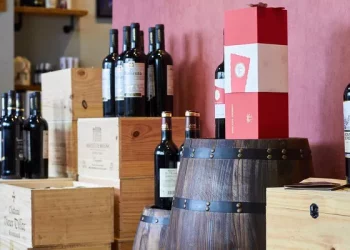With the development of China’s wine industry and the popularity of wine culture, more and more wine lovers and practitioners want to further learn systematically. WSET Wine course is a good choice.
So, what is WSET?
What are the levels of the WSET Wine Course?
WSET is the Wine & Spirit Eon Trust. Founded in 1969 in London, UK, WSET is the world’s most influential wine, Spirit and sake certification body. Its certification courses are taught in more than 70 countries in more than 19 languages.
For wine lovers and insiders.
In addition to offering wine, spirits and sake courses, WSET plans to launch online and offline beer certification courses in the future.
The WSET Wine certification program is divided into four levels, in order of difficulty from least to most, which are WSET Level 1 Wine certification, WSET Level 2 Wine Certification, WSET Level 3 Wine Certification and WSET Level 4 Wine Diploma Certification.
At present, WSET Level 1, Level 2 and Level 3 courses in China have both Chinese and English courses and textbooks available, but WSET Level 4 has not yet launched Chinese courses and textbooks.
Students who pass the examination will receive a WSET certification certificate and a badge, and can use the relevant WSET certification mark.
WSET Level 1 Wine Certification is the most basic wine course in WSET. It mainly introduces the basic knowledge of wine and the basic methods of wine tasting. It is suitable for lovers or people who have no knowledge of wine.
The main contents of the course include: the main types and styles of wine;
Common grape varieties and their characteristics;
The principle of food and wine matching;
How to store and serve wine;
How to use the WSET Level 1 systematic wine tasting method to taste wine.
Compared with Level 1 courses, Level 2 courses cover more systematic and comprehensive wine knowledge, which is suitable for wine industry workers and wine lovers.
Based on the level I courses, Level II will introduce wine tasting methods, principles of wine and table wine pairing, methods of wine making, factors influencing wine style, major international grape varieties and important wine regions, as well as sparkling wines and fortified wines.
In addition, Level 2 courses also cover the knowledge of wine classification system and wine label terminology, which is helpful for wine selection and purchase.
Those who pass the examination can obtain the “WSET Level 2 Wine certification”, which is often referred to as the “intermediate sommelier” in China.
WSET Level 3 Wine Certification is an advanced qualification course for the wine industry, with in-depth knowledge and strong professionalism, which is suitable for professionals and wine lovers engaged in the wine industry.
Those who pass the examination can obtain the “WSET Level 3 Wine certification”, which is often called “Senior sommelier” in China.
On the basis of the secondary and tertiary courses to further explore the vineyard geographical location, the vine growth environment, grape cultivation, wine production and maturation of content, and these factors on the style of wine, what affect the quality and price, and from a climate, vineyard management, grape varieties and winemaking and other aspects,
Detailed introduction to the main producing countries of still wine, sparkling wine and fortified wine.
In wine tasting, Level 3 focuses more on cultivating students’ ability to correctly evaluate the quality of wine.
Compared with the first three levels, the content covered by Level 4 is a great leap, and it requires far more time, effort and money than the first three levels.
WSET Level 4 is designed for people who want to advance to senior positions in the wine industry. Applicants must have attained WSET Level 3 certification.
The 6 units will cover wine production, wine trade, wines from around the world, sparkling wines and fortified wines, as well as learning how to conduct independent wine-related project research.
WSET Level 4 courses typically take between one and a half to three years to complete, with the official recommendation of no less than 500 hours of study.
Learners are given a test at the end of each unit, including a blind tasting session in the wine, sparkling and fortified units.
In addition, participants will be required to write a project paper of no less than 3,000 words, which will examine their ability to analyze current trends in the wine industry.
After understanding the above WSET wine course, many people may be wondering: Do we have to learn WSET course?
For most wine lovers, browsing wine knowledge websites and professional official accounts can also gain a lot of knowledge, but through systematic learning is conducive to the formation of a complete knowledge system framework, so as to better explore the beauty of the wine world.
In addition to WSET, wine courses are offered by several authorities, such as the International Sommelier Guild (ISG) and the Court of Master Sommeliers (CMS) in the UK.
However, in terms of popularity and the value of the certificate, the current WSET wine programme still has great advantages.
The latest market dynamics at any time to see, please pay attention to.












































